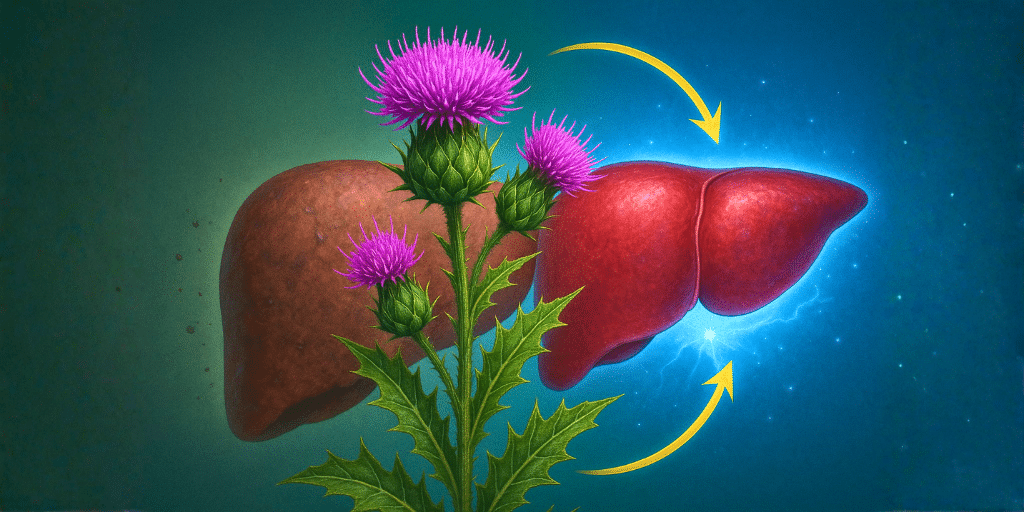
Recently, the topic of milk thistle and its supposed benefits for liver health has been popping up everywhere. Lots of people are asking: Should I take milk thistle for fatty liver disease? Is this supplement the miracle fix-up for all sorts of liver problems? (Based on the insights of Leonid Kim MD.)
Key Takeaways
- Milk thistle has a long history, but the evidence for its use in liver disease—especially advanced cases—is mixed.
- It seems to have a small effect on early-stage liver problems, but there’s no strong proof it works for more serious liver conditions.
- Most people tolerate it well; side effects are usually mild.
- Always talk to your doctor before starting any supplement, including milk thistle.
What Exactly Is Milk Thistle?
Milk thistle isn’t some new trend—it’s an old-world plant. People in Europe have used it for ages to treat all kinds of things, especially liver troubles. Back in the day, it was even used for snake bites and spleen problems. The part of the plant that matters is the seed, and the special ingredient inside is called silymarin. This is a mix of flavonoids and polyphenols—fancy words for natural chemicals that act as antioxidants.
How Might It Help Your Liver?
So, what’s the theory here? In a nutshell (or maybe a seed hull?), silymarin is thought to work because:
- It scavenges the damaging stuff (oxidative molecules) in your liver.
- It blocks inflammation, which is a big driver in liver disease.
- It may help liver cells repair themselves.
Some lab studies also suggest it helps prevent the buildup of scars and fibrosis, basically keeping things from getting worse. Again, that’s theory—but what about real life?
What Does the Evidence Say About Milk Thistle?
Here’s where things get bumpy. While some believe milk thistle is a game changer, actual studies give us a bit of a roller-coaster ride.
Trials With Alcohol-Related Liver Disease
Back in 2001, a big review pooled together a handful of studies to see if silymarin actually helped people with alcohol-related liver problems. The results? The group taking silymarin seemed to have lower liver-related deaths compared to folks on placebo:
| Group | Mortality Rate (per year) |
|---|---|
| Silymarin | 4.9% |
| Placebo | 9.3% |
That’s nearly double. Sounds promising—until you look at higher-quality, newer trials. A later, more in-depth review (with more strict rules) found that this benefit kinda disappears when you only include the best studies. Turns out, milk thistle might not do much, especially if your liver disease is already really advanced.
What About Liver Function and Fatty Liver?
Some good news: In less severe cases—like mild alcoholic liver disease—milk thistle shows a small bump in liver function. One study with 97 people found that four weeks on silymarin improved liver enzymes (fancy blood tests used to check for liver damage). There have also been small studies looking at non-alcoholic fatty liver disease (NAFLD). People with early fatty liver who took milk thistle saw stuff like their liver enzyme levels go down, their abdominal circumference shrink, and their BMIs get a little better.
Here’s a quick summary table of what was seen:
| Study Type | What Improved with Milk Thistle? |
|---|---|
| Alcoholic, mild | Liver enzymes, liver function |
| NAFLD, early | Liver enzymes, waist size, BMI, ultrasound |
Does It Help in Advanced Liver Disease?
Here’s where the buzz stops. In a study of people with more serious conditions like NASH (a fancier name for ballooned fatty liver disease), high-dose milk thistle only slightly cut down the buildup of scar tissue. But the main goal—big improvements in the disease—wasn’t met. So, for people with advanced liver trouble, there’s just not much to write home about.
Are There Side Effects or Risks?
Milk thistle sounds like it should be risk-free. For most, it pretty much is. The side effects are generally mild:
- Headache
- Diarrhea
- Nausea
Some people have taken up to 420 mg a day for four years in trials with no major problems. Even higher doses, up to 2100 mg a day (for shorter times), seem to be okay for most. Still, don’t grab a bottle and start chugging—these are just averages, and everyone reacts differently. Some supplements can mess with meds you’re already on.
Should You Take Milk Thistle for Your Liver?
This is the big question. Here’s my take after wading through all the data.
If you’ve just found out you have mild fatty liver or a small uptick in your liver enzymes, trying milk thistle probably won’t hurt—and it might help a little. If your liver disease is advanced (think NASH or cirrhosis), milk thistle hasn’t really shown any major benefits.
I don’t usually tell my patients to start milk thistle for their livers. But if someone already takes it, isn’t on conflicting meds, and is feeling fine? I don’t always rush to stop it either. It’s your call—just double-check with your primary care or liver doctor first.
Summary Table: Benefits and Limitations
| Stage of Liver Disease | Evidence of Benefit |
|---|---|
| Mild/early fatty liver | Small improvement |
| Advanced (NASH, cirrhosis) | No good evidence |
The Bottom Line
Milk thistle isn’t a miracle cure, but for some, it’s worth a try. Just don’t expect it to magically reverse years of liver trouble, and definitely don’t skip medical advice. Keep an eye on your liver numbers, listen to your doctor, and remember—supplements are meant to supplement, not replace, solid medical treatment.
Ever tried milk thistle? Did you see any change? Drop a comment—real stories help everybody else figure this stuff out too.
Source: Leonid Kim MD

